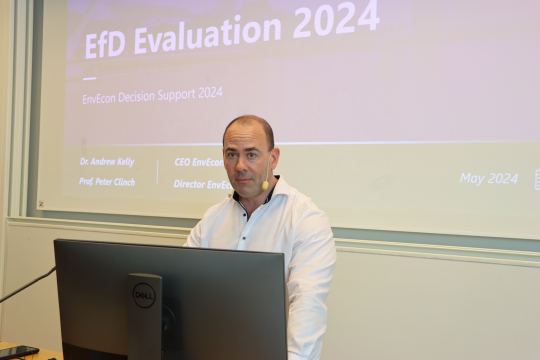EfD’s largest program, known as GLOBEN EfD or the core program, has recently been reviewed by external experts for its performance from 2021 to 2023. The main areas of focus were research, financial and institutional sustainability, and collaboration.
The research assessment conducted using the UK REF methodology was exceptionally thorough, evaluating 172 researchers and 550 papers. It meticulously examined the quality of scholarly output, its impact, and the research environment at EfD centers. A concern was that when academic quality improves, local relevance and impact may decrease. However, the evaluation revealed that EfD’s research remains highly relevant locally, driving substantial impact, while maintaining rigorous international academic standards.
One of EfD’s central objectives is to cultivate dynamic research environments. Researchers in the Global South, particularly in sub-Saharan Africa, often contend with heavier workloads compared to their counterparts at leading global universities. To mitigate this, evaluators suggest that EfD should intensify its efforts to identify strategies that alleviate researchers’ administrative burdens and teaching responsibilities. By doing so, researchers can allocate more time to making meaningful contributions in their respective fields.
EfD strives to foster collaboration among researchers from diverse countries and groups. Although EfD’s thematic research programs perform well in terms of research and involvement from researchers across the network and beyond, there exists significant untapped potential for interaction with policymaking processes.
The financial sustainability of EfD has increased considerably, mainly because the local research centers have been successful in securing more funding. The Global Hub, which coordinates the network, has also started new projects that involve these centers. Looking ahead, there’s great potential for EfD’s thematic research to bring in additional funding.
In terms of institutional sustainability, many centers have transitioned from being temporary projects to established centers. They’ve overcome various challenges in the past few years, such as the COVID pandemic, societal conflicts, and sudden and unexpected changes in leadership. The evaluation suggests that the EfD Global Hub could offer more formalized support to centers that are struggling and better recognize various internal and external factors that affect their progress, with the goal of becoming more resilient.
The evaluation also recognizes that EfD has made significant progress in terms of women’s participation. Initiatives such as training, mentorship, and targeted efforts to promote women in leadership roles within research have yielded positive results. However, given the substantial underrepresentation of women in Economics’ departments worldwide, additional efforts are needed. EfD is committed to contributing to more substantial change in the years ahead.
Another important recommendation by evaluators is that there is an opportunity for EfD to improve its marketing, both for its centers and its programs. An important aspect that EfD will focus on in the coming years is to better promote its researchers and their work.
The recommendation to increase the use of Artificial Intelligence is currently in progress. Efforts are underway in areas such as administration, capacity building, research tools, data analysis, and policy applications.
EfDs Executive Director, Gunnar Köhlin reflects on the evaluation:
“I would like to extend a heartfelt gratitude to our center researchers and staff for their unwavering dedication and hard work during the past three tumultuous years. I would also like to thank the evaluators for their comprehensive review and insightful recommendations, and to Sida for their steadfast support. Armed with this feedback, we will now develop a new strategy and intensify fundraising efforts for our centers in the Global South, to conduct impactful research and engage in dialogues with policymakers. Step by step, we aim to make a difference for people in poverty in the Global South, and for the environment they depend on.”
The evaluation was carried out by the consultancy EnvEcon Ltd. It is available in full here.
By: Susanna Olai
